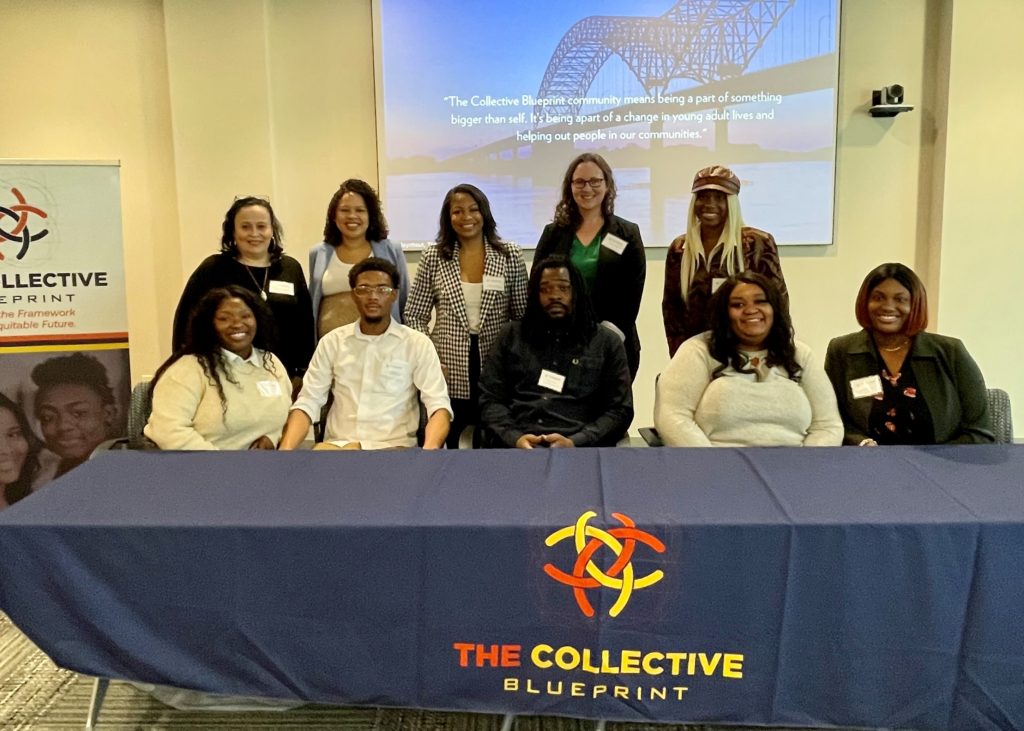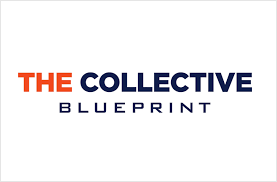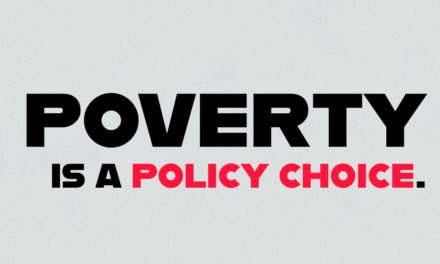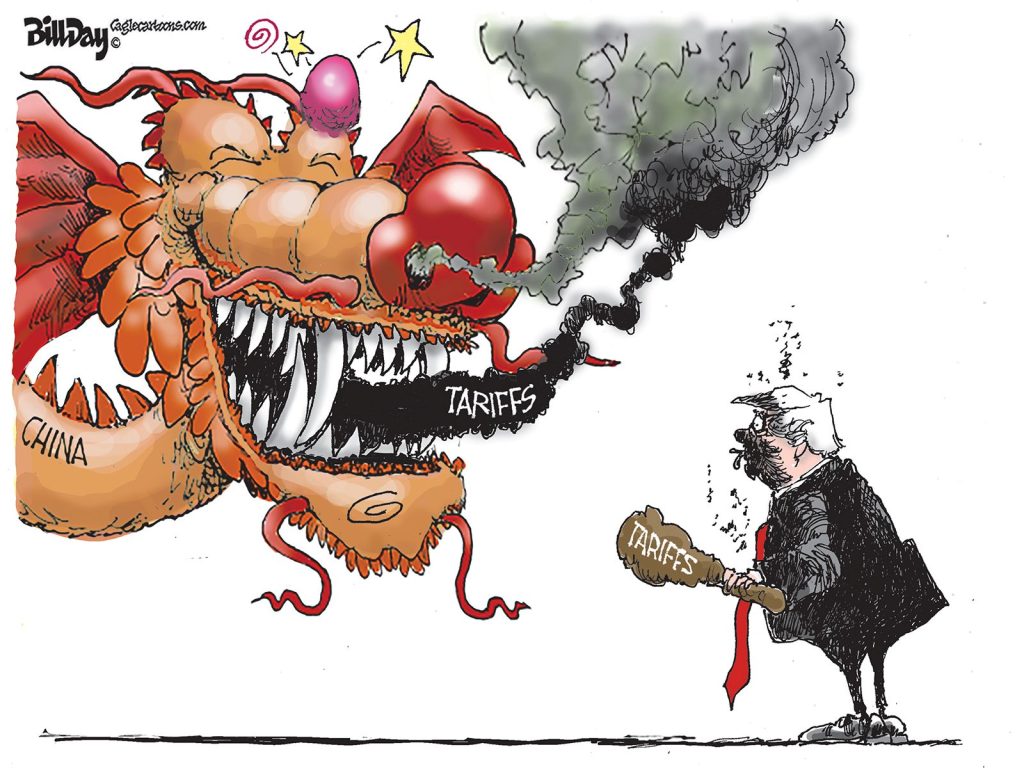For 30 years, the Memphis population who are 16-24 years-old and aren’t either in school or working has been stubbornly consistent – in 1990, it was 19% and in 2019, it still was.
In other words, 45,000 young men and women remain members of what is called Opportunity Youth or Unconnected Youth, whose numbers are evidence that the talk about so many adrift young people has far outstripped the action to do something about it.
Collective Blueprint, the six-year-old Memphis nonprofit organization, has set out to change the inaction. It is the only organization focused solely on 16-24 year-olds who do not work or go to school. So far, 200 people are proof points of success.
While Collective Blueprint remains clear-eyed about the scope of the Opportunity Youth challenge, the panel discussion it organized last week powerfully indicated that it is not a hopeless challenge and there is now a community framework that can build pathways to careers.
 Providing inspiration to about 50 people in attendance were Collective Blueprint graduates Leslie Allen, property management, 2020; O’Ryon Davis, medical device finishing, 2019; JaVonni Merritt, information technology, 2022; Quin Taylor, emergency medical technician, 2019; and Arianna Whitlow, information technology, 2019.
Providing inspiration to about 50 people in attendance were Collective Blueprint graduates Leslie Allen, property management, 2020; O’Ryon Davis, medical device finishing, 2019; JaVonni Merritt, information technology, 2022; Quin Taylor, emergency medical technician, 2019; and Arianna Whitlow, information technology, 2019.
Focused on Opportunity Youth
Collective Blueprint co-founders Sarah Lockridge-Steckel, CEO, and Sabrina Dawson, vice-president of programs, have built the Blueprint on a foundation of programs, systems, and policy. All that is done is based on the reality that the current economic structure in Memphis is inequitable and traps too many people into dead-ends that eliminate options that many of us take for granted.
Years ago, in a discussion about risk factors, Cate Joyce, then a researcher at Urban Child Institute, mapped out the formidable barriers faced by a significant percentage of Memphis children. What’s surprising, she said, was how pervasive these obstacles are but also how many children surmount them.
Collective Blueprint is all about improving those odds by doing more than providing information about jobs and workforce programs. More to the point, as the only organization dedicated to responding to the needs of this specific group of young adults, the Collective set out to build a community.
Crucial to their success is the emotional support that provides counseling, strong one-on-one mentor relationships, and stringent accountability. These added elements open up career pathways, prepare participants for additional education or training, and nurture participants so they do not feel alone in their journey to a career.
Odds Stacked Against Them
This support and encouragement are regularly missing ingredients in the lives of Opportunity Youth:
- They often live in neighborhoods of concentrated poverty.
- They often live in poverty and so do most of their friends.
- The odds are dramatically stacked against them – 1% of children in the bottom 20% have the chance to reaching the top 20%. These are the worst odds of any city in the continental U.S.
- One in four of 16-24 year-old African Americans are not working or in school.
- Most have experienced toxic stress that comes from adverse childhood experiences, which are traumatic experiences that children before the age of 18 that can have lasting impacts on mental health, physical health, and general well-being.
That’s what makes these young adult panelists and their stories so remarkable. In the midst of tumultuous situations, they were willing to reach out and on this instance, the Collective reached back.
Community of Support
Based on their comments, there is no way to underestimate the importance of this human relationship to the panelists’ success.
It’s what the founders and panelists call a “community of support” that replaces an environment that tells Opportunity Youth that they live in a city where they have no value. “In Memphis, we need to see more youth prevention and intervention programs and mental health program for children,” said a panelist. “There’s a lot of the attitude, ‘he’ll be ok,’ and we need to tackle mental health at any early age.”
Another said: “I can remember my only meal was at school. Momma made sure I got on the bus so I had hot meals. Memphis needs to feed children so children have something to hope for rather than having to focus on basic needs at such an early age.”
The community of support is “about you seeing yourself in a career and knowing you can make it through difficult challenges,” one person said. Another added: “It’s about learning to adapt to and embrace change. I had difficult barriers so I would say, ‘the universe doesn’t want me to go to school.’ I would have said school is not for me. Now things come to me and I weigh opportunities.”
All of the participants said they are now advocates for the Collective. “I tell everyone about its end goals. I say, ‘let’s get you in school’ and I’m looking for more ways to speak up and have a voice in my community and ask what system changes do we need.”
Looking to the future, it was said “the first thing is everyone believing things can change – not just young adults but the community believing what young adults can do.”
Their Best Lives
In assessing what Memphis needs, the panelists recommended more things for young adults to do, education about the history of Memphis – “I didn’t get much education about Memphis growing up so I didn’t know enough to help Memphis get better” – and better jobs, pathways into financial freedom, and better public transportation options.
The panel discussion was an insightful look into the minds and lives of Opportunity Youth who have moved out of that category into a new one – self-sufficiency. Seventy-four percent of its 200 graduates are employed one to two years after graduation with an average $31,000 increase in earnings.
The Collective Blueprint’s vision is compelling: all young adults have the power and the tools needed to live their best lives. The panelists – and their fellow graduates – are proving that they want the power and their best lives.
As I have written often, the #1 economic development opportunity for Memphis is to close the racial income gap. It would increase our regional GDP by $26 billion and to reach it, we need initiatives on a variety of fronts.
It’s difficult to imagine one more important than the Collective Blueprint.
**
Join us at the Smart City Memphis Facebook page for additional postings.





Impressive.